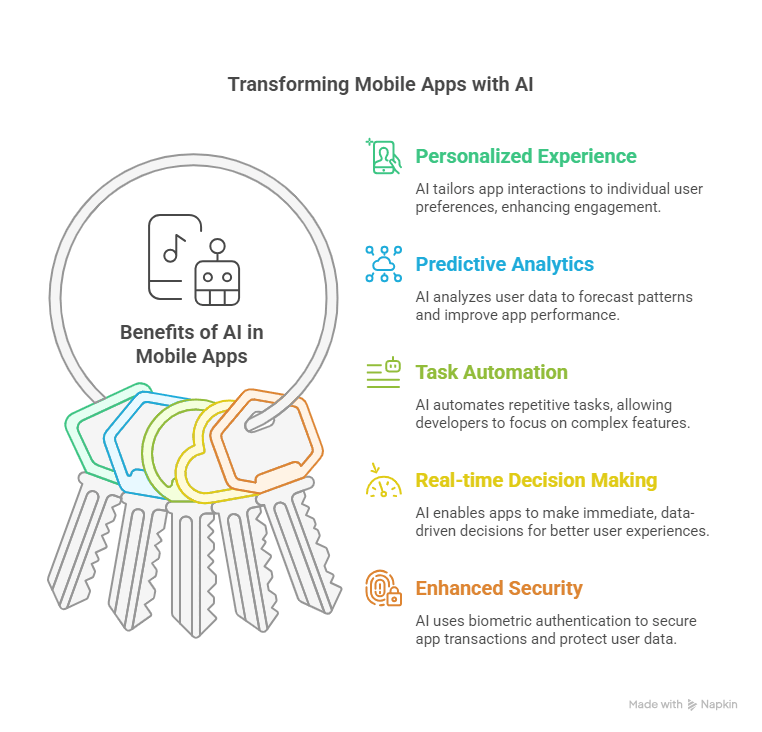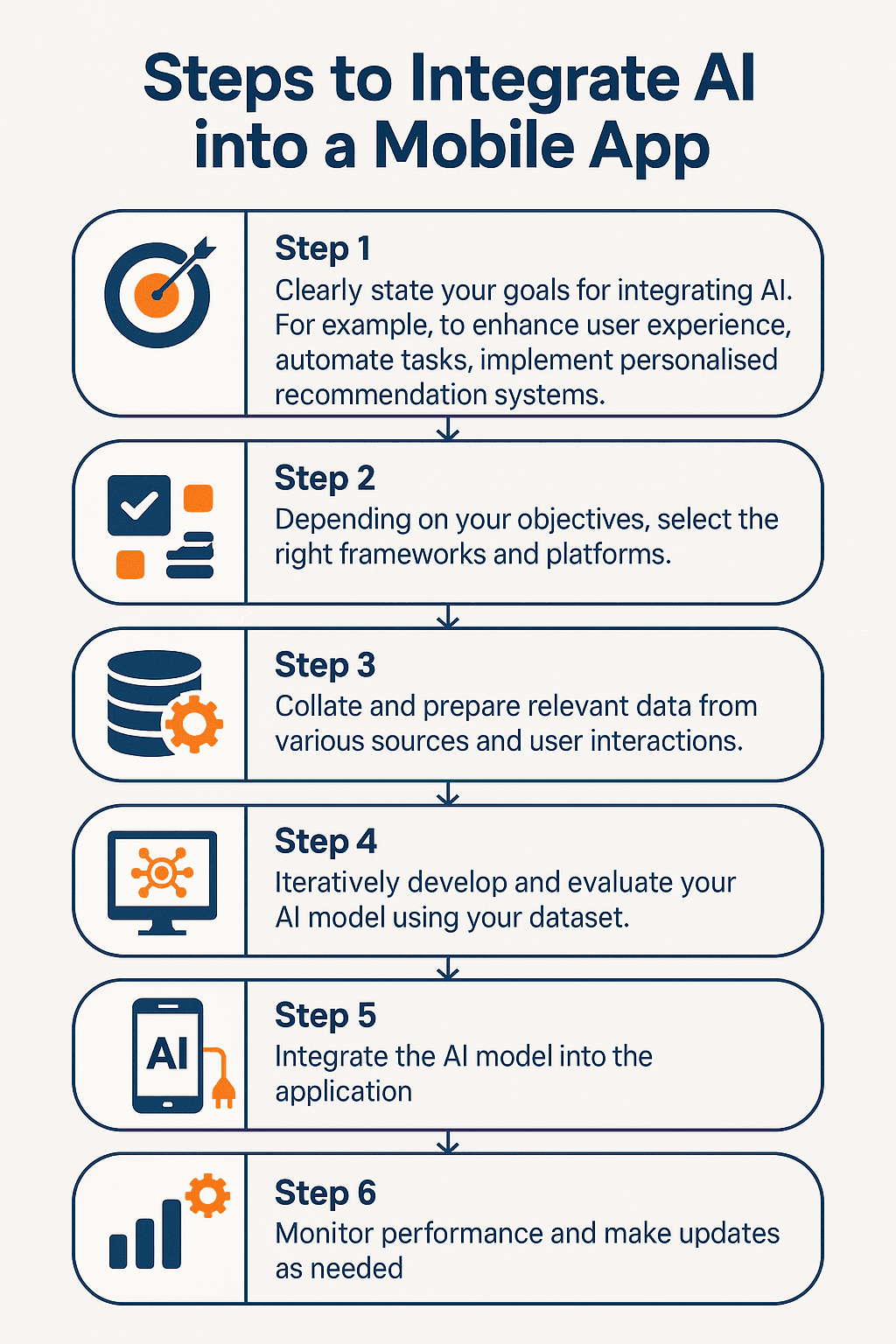AI Integration with Mobile Apps: Comprehensive Guide

Key Takeaways
- AI integration enhances mobile app functionality through personalisation, automation, and real-time decision-making.
- Core AI technologies include machine learning, NLP, computer vision, and deep learning.
- Benefits: Improved user experience, predictive analytics, biometric security, and automation of repetitive tasks.
- Common use cases include chatbots, recommendation engines, voice/image recognition, fraud detection, and fitness tracking.
- Developers can use platforms like TensorFlow Lite, Core ML, ML Kit, and cloud-based services (AWS, Azure, Google Cloud) for integration.
- Challenges include data privacy, model optimisation, and limited mobile processing power.
Introduction
Artificial Intelligence (AI) is revolutionising the design and development of mobile applications—drastically altering the field. It’s enabling mobile apps to deliver personalised experiences that enhance user satisfaction and engagement.
Furthermore, AI automation and computer vision technologies are making mobile apps more user-friendly and sensitive to user needs. Beyond automation and personalisation, incorporating AI into mobile apps gives businesses a competitive edge.
Businesses can make informed decisions and dynamically adjust their strategies by exploiting AI-powered analytics.
Additionally, to sustain user loyalty, AI-driven features such as voice-driven interfaces and predictive analytics are becoming increasingly crucial.
This blog aims to discuss AI's contribution to modern mobile app development. It also aims to unpack how it facilitates developers in devising more intelligent, responsive, and user-centred apps that spur innovation and industry expansion.
What is AI integration in mobile apps?
AI integration in mobile apps refers to the process of incorporating AI features into mobile applications to enhance their usability and functionality.
AI integration principally revolves around the innovative implementation of machine learning, natural language processing, and computer vision technologies. These technologies consequently aim to achieve intelligent features that can learn, adapt, and make informed judgments based on user data.
Overall, there are two primary approaches to AI implementation in mobile apps. First, AI-enabled apps, which assimilate AI elements into pre-existing functionality. Second, AI-native apps, which are created with AI at their heart and provide smooth and optimised user experiences.
Read: Guide To Enterprise Mobile App Development For Your Business
Benefits of integrating AI into mobile apps

The benefits of integrating AI in mobile apps can be summarised as:
- Personalised user experience: AI enables mobile apps to programmatically examine user preferences and behaviour, thereby offering recommendations that augment user engagement and loyalty.
- Predictive analytics & user behaviour analysis: AI-powered predictive analytics can identify patterns in user activity. The output can be exploited to improve conversion rates and propel user engagement.
- Automation of repetitive tasks: AI frees mobile developers to focus on more nuanced aspects of app development by automating repetitive processes.
- Real-time decision making: AI facilitates real-time decisioning through adaptive interfaces and rapid recommendations by utilising real-time data. This capacity improves the user experience.
- Enhanced security through biometric recognition: AI-powered biometric authentication mechanisms ensure safe mobile app transactions.
Popular use cases of AI in mobile apps
Here are some common instances of how AI is being deployed in mobile apps:
- Chatbots and Virtual Assistants: AI-driven solutions are being utilised to assist consumers with tasks such as booking appointments. Siri and Google Assistant are a few examples.
- Recommendation engines: AI-powered engines are improving user experience in streaming services by providing content recommendations based on user behaviour. For example, Netflix suggests shows using AI based on user viewing history.
- Voice and Image Recognition: AI is enhancing user interaction and security by enabling advanced image recognition and speech-to-text conversion. For instance, Google Lens is leveraging computer vision and neural networks to analyse objects captured by a smartphone's camera.
- Cybersecurity and Fraud Detection: AI is helping to identify unusual trends and abnormalities, preventing fraud and unauthorised access, thereby ensuring secure mobile app transactions and data protection within apps like Paypal.
- Fitness & Health Tracking: Apps like Fitbit Premium are leveraging AI to provide individualised wellness recommendations, personalised training regimens and measure progress.
- Localisation and Language Translation: AI-powered translation mobile applications are powering real-time language translation capabilities. This facilitates inter-regional and inter-language communication, thereby enhancing the global accessibility of apps.
Key technologies behind AI-powered mobile apps
Several technologies underpin AI-powered mobile apps. Let’s take a look at them, shall we?
- Machine Learning (ML): ML powers mobile apps to learn from user data and evolve over time—enabling features like personalised recommendations. For instance, Spotify employs ML to create playlists like "Discover Weekly" based on listening habits.
- **Natural Language Processing (NLP)*: NLP mechanisms enable mobile apps to ‘comprehend’ and ‘react’ to human language in text or speech. For instance, Siri and Google Assistant leverage NLP for voice commands.
- Computer Vision: This technology aids apps in interpreting visual data—enabling features like object detection and facial recognition. For instance, Google Lens exploits computer vision to programmatically identify objects.
- Deep Learning: As a subset of machine learning, deep learning powers sophisticated functions like predictive analytics and image identification. For instance, Netflix uses deep learning to make user-specific content recommendations.
- AI Frameworks & Tools: TensorFlow Lite, Core ML, and ML Kit are platforms that facilitate the integration of AI into mobile apps. For example, ARKit in iOS apps is powered by Core ML to enable AR experiences.
Platforms and tools for AI integration in mobile apps
Here are several platforms and tools that are the benchmark for incorporating AI into mobile apps:
- For Android: Android developers can exploit TensorFlow Lite for on-device machine learning and ML Kit to integrate pre-trained models. These technologies enable safe and effective AI processing, powering tasks ranging from text recognition to the deployment of custom models.
- For iOS: iOS developers utilise Core ML to integrate machine learning models into apps. They also leverage Create ML for the development of unique models directly on Apple devices.
- Cross-platform tools: Developers may leverage cross-platform frameworks like TensorFlow.js and TensorFlow Lite to deploy AI models across Android and iOS. For example, React Native and Flutter can facilitate AI capabilities across several disparate mobile operating systems and streamline app development.
- Cloud-based AI solutions: AI systems can also run on the cloud—such as Google Cloud AI, AWS AI, and Azure Cognitive Services—without requiring on-device processing.
How to integrate AI into a mobile app (Step-by-Step)
To successfully integrate AI into a mobile app, several systematic steps need to be considered for the best outcome.
- Step 1: Clearly state your goals for integrating AI. For example, do you seek to enhance user experience, automate tasks, and implement personalised recommendation systems? This stage guarantees alignment with corporate objectives and directs the entire AI development process.
- Step 2: Depending on your objectives, select the right frameworks and platforms. Whether TensorFlow, Core ML, or cloud services like AWS and Google Cloud, consider elements like ease of integration, scalability, and compatibility.
- Step 3: Collate and prepare pertinent data from various sources and user interactions. Ensure that the gathered information is accurate, well-organised, and indicative of your goals.
- Step 4: The next step is to iteratively develop and evaluate your AI model using your dataset. Thoroughly test the models and make any necessary adjustments iteratively to ensure they function as expected.
- Step 5: Subsequently, integrate the AI model into the application. You can do so directly—or by utilising APIs to facilitate real-time communication.
- Step 6: Afterward, track performance and iteratively make necessary updates. Utilise new data to incrementally augment the app's features and iteratively train the AI models.

For the most optimal outcome, utilise scalable technologies, set clear goals, and keep a close eye on performance. Poor model testing, inadequate data quality, and disregarding user feedback are common issues that many developers encounter. Also read: Mobile Application Development Life Cycle (Phases & Steps)
Challenges of AI integration in mobile apps
AI integration in mobile as a nascent domain still faces several challenges, such as:
- Data privacy and ethical concerns: Data security and privacy are major considerations when integrating AI into mobile apps. To secure user data from breaches and misuse, developers must adhere to data protection laws such as GDPR. They must also address issues such as algorithmic bias to avoid unforeseen repercussions.
- Model accuracy and performance trade-offs: Achieving optimal efficiency dictates a careful balance between model accuracy and performance. To ensure that various algorithms meet accuracy and performance standards, developers must extensively assess and test them.
- Limited processing power and storage on mobile devices: Implementing AI models can sometimes be exceedingly challenging on mobile devices due to their limited processing power and memory. To avoid performance deterioration, developers must optimise AI integration, particularly on low-end devices.
AI integration trends in mobile app development (2025 & Beyond)
For 2025 and beyond, we expect to see an uptick in the following trends for integrating AI into mobile app development:
- Generative AI in mobile UI/UX: Generative AI will transform mobile UI/UX by automating design processes, such as colour schemes and layout development. Mobile apps will possibly be able to modify their designs in real-time in response to user input and behaviour. It, therefore, improves user engagement and experience. Additionally, generative AI will expedite the design process—freeing developers to concentrate on more nuanced aspects of app development.
- AI-driven app testing and development automation: By generating code, identifying errors, and suggesting enhancements, AI technologies will significantly automate testing and development procedures. This automation will enable developers to focus on the strategic and creative aspects of app development.
- On-device AI (edge computing): We can expect significant advancements in edge computing applications for mobile devices. This type of AI does not rely on cloud services. Instead, it processes data directly on mobile devices. This approach enhances real-time speed and reduces latency for applications like AI voice assistants.
- Integration with AR/VR: We should see appreciable improvements in AR/VR capabilities to deliver tailored content. Such advancements will further revolutionise sectors, including retail, entertainment, and education.
Conclusion: Final Thoughts: Is AI right for your mobile app?
AI integration is seismically changing the mobile app market. By examining user behaviour and preferences, it takes personalisation to another level.
Chatbots with AI capabilities are enabled to provide round-the-clock customer service, enhancing customer satisfaction and cutting expenses. AI also enhances mobile app security by identifying weaknesses and implementing enhanced login procedures.
Additionally, it enhances interactions by enabling smooth search experiences through voice and image recognition. AI also provides enhanced insights, automates repetitive tasks, and streamlines procedures. It, therefore, allows developers to make well-informed decisions whilst spurring innovation.
To assess the return on investment of AI integration, businesses should track key metrics such as user engagement, revenue growth, and operational efficiency. Furthermore, the choice between pre-built AI APIs and custom AI models depends on one’s specific needs.
Suffice it to say that companies that ignore AI integration with mobile apps risk being left behind.
At Techies, we help with integrating AI in mobile app development process—enabling you to take advantage of AI's revolutionary potential. So, kindly reach out to remain competitive and spur new growth.
Digitizing businesses since 2017
© 2025 Techies | All rights reserved


